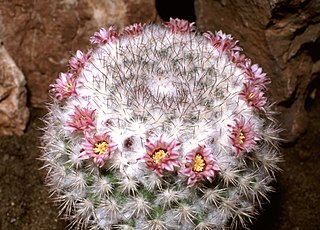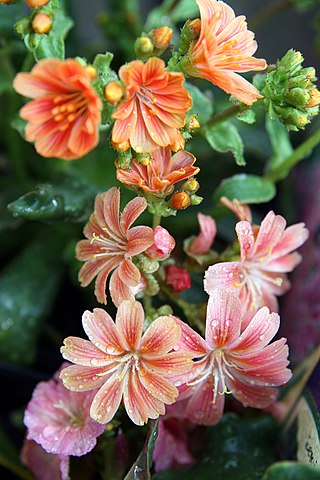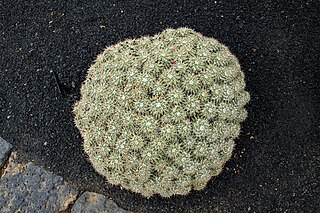
Mammillaria is one of the largest genera in the cactus family (Cactaceae), with currently 200 known species and varieties recognized. Most of the mammillaria are native to Mexico, but some come from the southwest United States, the Caribbean, Colombia, Venezuela, Guatemala and Honduras. The common name "pincushion cactus" refers to this and the closely related genus Escobaria.

Cochemiea is a genus of cactus. It has previously been synonymized with Mammillaria, but molecular phylogenetic studies have shown that when broadly circumscribed, Mammillaria is not monophyletic, and Cochemiea has been accepted as a separate genus.
Neolloydia is a formerly recognized genus of cacti. The genus was first erected by Britton and Rose in 1922. Edward F. Anderson regarded Neolloydia as being poorly defined, with the result that species that had at times been included in Neolloydia were afterwards placed in multiple genera, including Coryphantha, Echinomastus, Escobaria, Mammillaria, Sclerocactus, Thelocactus and Turbinicarpus. In his 2001 book, Anderson firmly placed only one species in the genus, Neolloydia conoidea, with another, Neolloydia matehualensis, being regarded as only a variant of N. conoidea. As of December 2022, Plants of the World Online treated Neolloydia conoidea as a synonym of Cochemiea conoidea, and Neolloydia as a synonym of Cochemiea.

Mammillaria dioica, also called the strawberry cactus, California fishhook cactus, strawberry pincushion or fishhook cactus, is a cactus species of the genus Mammillaria. Its common name in Spanish is biznaga llavina.

Lewisia is a plant genus, named for the American explorer Meriwether Lewis (1774-1809) who encountered the species in 1806. The native habitat of Lewisia species is rocky ground and cliffs in western North America. Local Native Americans ate the roots, which have also been used to treat sore throats.

Mammillaria rhodantha, the rainbow pincushion, is a plant in the cactus family (Cactaceae) and is one of 171 species in the genus Mammillaria which are characterized by having nipple-shaped tubercles or prominences on their surface.

Mammillaria elongata, the gold lace cactus or ladyfinger cactus, is a species of flowering plant in the family Cactaceae, native to central Mexico. Growing to 15 cm (6 in) tall by 30 cm (12 in) wide, it consists of densely packed clusters of elongated oval stems, covered in harmless yellow or brown spines, and in spring producing white or yellow flowers. It is among the most common and most variable of its genus in nature, and is a popular subject for cultivation. It has gained the Royal Horticultural Society's Award of Garden Merit.

Mammillaria spinosissima, also known as the spiny pincushion cactus, is a species of flowering plant in the cactus family Cactaceae, endemic to the central Mexican states of Guerrero and Morelos, where they grow at elevations of approximately 1,600 to 1,900 metres. The species was described in 1838 by James Forbes, gardener of the Duke of Bedford. Botanist David Hunt collected a specimen in 1971, when he located one near Sierra de Tepoztlan, Mexico.

Mammillaria marksiana is a cactus in the genus Mammillaria of the family Cactaceae.

Mammillaria standleyi is a species of the family Cactaceae native to the Sierra Madre Occidental of Sinaloa, Chihuahua and Sonora. It has red-purple flowers surrounded by cottony pubescence. Fruits are red and edible, tasting like apples, although too small to be of much food value to humans.

Mammillaria carnea is a species of cactus in the subfamily Cactoideae.

Mammillaria brandegeei is a species of cactus in the subfamily Cactoideae.

Mammillaria crinita is a species of cactus in the subfamily Cactoideae.

Mammillaria muehlenpfordtii is a species of cactus in the subfamily Cactoideae.

Mammillaria compressa, commonly called mother of hundreds, is a species of cactus in the subfamily Cactoideae. It is native to northern and southern Mexico, and is cultivated as an ornamental plant. It blooms in the winter and early spring, with bell-shaped flowers that range from a purplish pink to red color. Its curved spines were traditionally used as hooks for fishing.

Mammillaria sphaerica, the longmamma nipple cactus or pale mammillaria is a species of flowering plant in the cactus family Cactaceae, native to south eastern Texas in the USA and north eastern Mexico, where it occurs in scattered patches at altitudes up to 1,000 m (3,300 ft). It forms clumps of small pale green spheres to 5 cm (2.0 in) in diameter, with short hairs and pale yellow flowers up to 3 cm (1.2 in) wide in summer.

Mammillaria pringlei, called the lemon ball, is a species of cactus in the genus Mammillaria, native to Mexico, from Querétaro through to Veracruz and on to México State. It has gained the Royal Horticultural Society's Award of Garden Merit.

Mammillaria petterssonii is a species of cactus in the genus Mammillaria, native to northeast and southwest Mexico. It has gained the Royal Horticultural Society's Award of Garden Merit.

Mammillaria laui is a species of cactus in the genus Mammillaria, native to Tamaulipas state in Mexico. A number of subspecies were described, occurring along an elevation gradient; these are no longer accepted. It is listed as Critically Endangered (CR) in the wild. As Mammillaria lauii it has gained the Royal Horticultural Society's Award of Garden Merit.

Mammillaria hernandezii is a species of cacti in the tribe Cacteae. It is native to Mexico where it has a disjointed distribution in a small area of upland tropical pine scrub. There are estimated to be fewer than 500 plants in the wild and is classified as endangered.



















